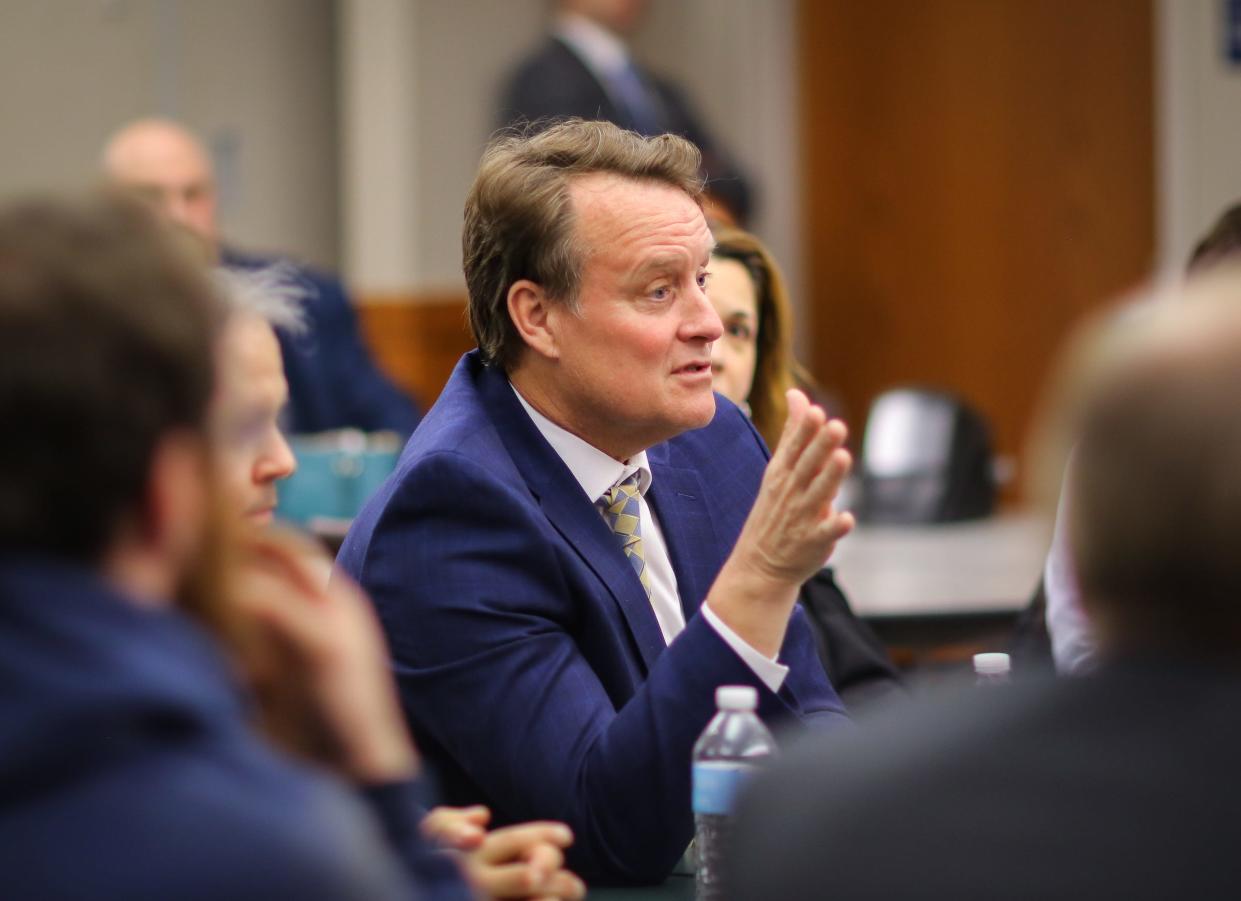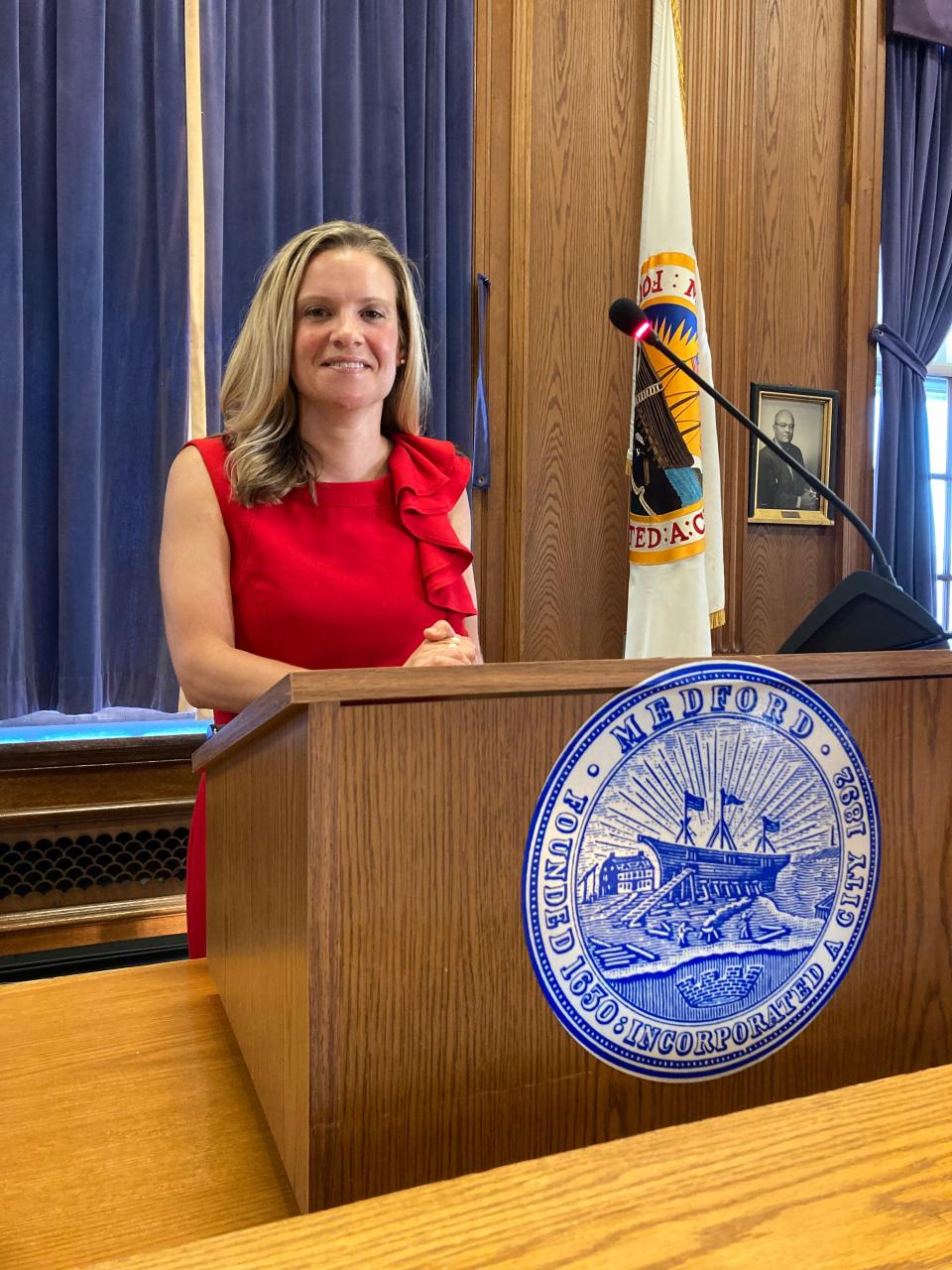Moore: No sex offenders for jobs in cannabis retail, delivery

WORCESTER - Concerned about the safety of Massachusetts residents accessing retail shops and delivery service of cannabis products, Sen. Michael Moore, D-Millbury, Friday asked the Cannabis Control Commission to keep reviewing worker criminal histories to ensure convicted sex offenders be barred from jobs that put them in contact with the public.
In his remarks during the meeting at the commission's Worcester headquarters, Moore noted that other companies with an extensive public interface, mentioning the ride-share companies by name, have aggressive background checks of drivers and routinely restrict employment of people with criminal histories.
“We are talking about the health, safety and well-being of Massachusetts residents,” Moore said, explaining he hopes to mitigate risks to the public.
The senator’s request came as the Cannabis Control Commission heard public comments on its draft regulations, published last month, on how to implement revisions made to state law last summer. The “clarifying” bill was signed by former Gov. Charlie Baker in August 2022 and gave the commission a year’s head start to revising the law. It goes into effect Nov. 9. The provision that the commission review every host community agreement for compliance with state law goes into effect in May 2024.
The commission will meet again Sept. 14 to discuss testimony, both oral and written. The November deadline may impel the commission to schedule an additional hearing Sept. 15. A third meeting is already on the calendar for Sept. 18.
While most of the testimony offered during the meeting Friday revolved around those agreements and the community impact fees charged, some participants pleaded with the commission to speed up implementation of the new law.
Applicants for marijuana business licenses have been put on hold by communities that are waiting for the new regulations to be implemented. Those drag times put a financial burden on applicants who may be paying rent to hold properties, may be paying attorney fees and have other expenses related to opening the business.
Expediting implementation could alleviate that burden and allow the applicant and the municipality to come to an agreement and let the licensing process continue.
Those speakers representing municipal concerns; several mayor and town administrators attended the hybrid meeting, asked the commission to implement a two-tiered system when it comes to reviewing host agreements. They suggested that the existing HCAs be allowed to sunset or expire at the end of their term, and that only new agreements be reviewed by the commission as required under the clarification.
Municipalities claim negotiations all 'in good faith'
Those speakers unanimously cited the “good faith efforts” that went into negotiating those agreements.
Medford Mayor Breanna Lungo-Koehn “begged” the commission to implement that two-tiered system and allow those HCAs signed before the changes in the law to expire.
“Medford has a tremendous amount to lose,” Lungo-Koehn said. Medford has signed agreements with three recreational retailers. The first was signed in March 2022, the second at the end of June and the third was signed in August. The mayor believes a review of the three existing HCAs she signed would open the door to litigation, sour residents to the businesses and even ruin the relationships the city has built with its three licenses for adult recreational marijuana retailers.

The mayor also signed a cultivation license in July.
“There was no bullying in Medford,” Lungo-Koehn said.
Retailer Diego Bernal, who has Coastal Healing, a business on the South Coast that has been open for 11 months, told the commission that his municipality made it clear from the start that it would extract as much financial benefit from hosting the marijuana business as possible.
With his life savings on the line, Bernal told the commission that he was willing to sign anything and pay what was demanded in order to secure the agreement and not lose the opportunity to open the business.
“Everything was on the line, I could have lost everything, and I’m not a big company,” Bernal said. In discussing his impact on the municipality, Bernal noted that “we have not brought any added cost to the town.”
Marijuana businesses more boon than bane
In fact, marijuana businesses have been more of a boon than a bust to Massachusetts municipalities. Even municipal managers have agreed that the benefits of hosting a marijuana business — increased value to commercial real estate, increased commerce and even increased safety in certain neighborhoods — have benefited communities. That is even without factoring in the 3% tax on gross annual revenue community impact fee exacted by most municipalities of applicants.
Melrose Mayor Paul Brodeur, who was a state representative when marijuana was legalized, said marijuana businesses were lining up in their eagerness to open in Massachusetts.
“They were well represented by attorneys and lobbyists who were advocating on their behalf,” Brodeur said, adding it would not be “fair” to the municipalities that opened their doors, that these applicants be granted relief from existing contracts. Making the licensing process more equitable should not come at the expense of municipalities that negotiated “in good faith.”
“Our retailer entered the market with their eyes wide open,” Brodeur said, adding that the business has advised Melrose that it will no longer pay the 3% gross revenue tax pending implementation of regulations.
Alissa Nowak, a social equity license holder, founder of Lucky Green Ladies, a delivery company, implored the commission to clarify the rules pertaining to license renewals. In the revision, the commission failed to clarify what happens if a municipality declines to renew a host agreement or opts to discontinue its relationship with a cannabis business.
Delays in the review and renewal process work in favor of municipalities while punishing business owners, Nowak said. If municipalities drag down the process, the repercussions should fall on the municipalities, not on the applicants.
Delays can put big financial bite on applicants, business owners
“I have spent $30,000 in attorney fees, and I still don’t have a host community agreement,” Nowak said. As a social equity applicant, she does not have the deep pockets of some marijuana businesses, and the delay is draining her savings.
Nicholas Obolensky, a Rhode Island attorney specializing in marijuana businesses, said that he believes the law, as originally written, was clear enough. He noted the law said a municipality may include a community impact fee of up to 3% of gross annual revenue, to ameliorate an expense that was reasonably related to the business.
“When I hear municipalities claim they negotiated in good faith, I have to laugh,” Obolensky said. “The municipalities had my clients over a barrel.”
He also urged the commission expedite implementation of the regulations and to make review of all host community agreements retroactive, at least to August 2022.
This article originally appeared on Telegram & Gazette: Commission will meet Sept. 14, discuss possible tweaks to new law

